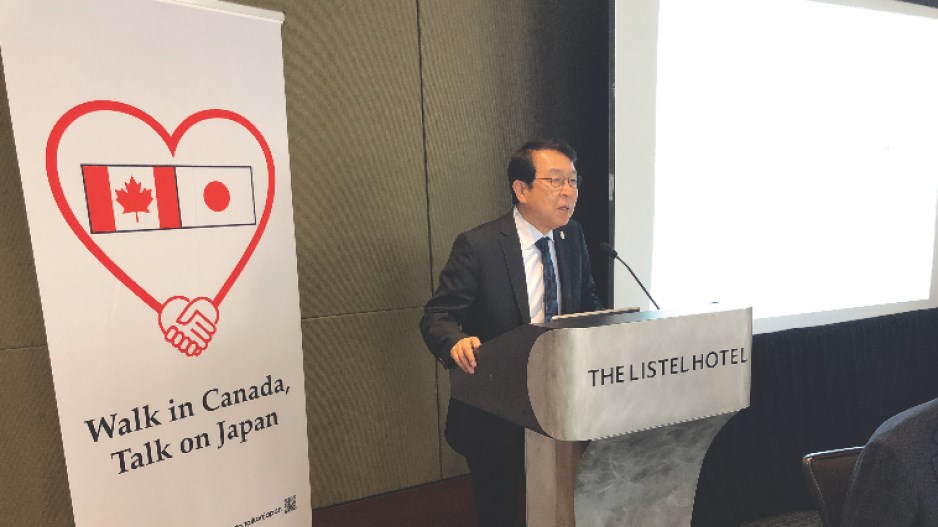With the United States and Japan reaching a limited trade deal that opened the Japanese market to U.S. meat and agricultural exports, many Canadians have decried the agreement as the end of a yearlong opportunity for Canadian industries in the world’s third-largest economy.
But a former Japanese ambassador to Canada said during an appearance in Vancouver that the opportunity isn’t lost, provided that Canadian decision-makers commit to a “deeper” relationship with Tokyo that stretches beyond trade and investment issues as outlined in the Comprehensive and Progressive Agreement for Trans-Pacific Partnership (CPTPP, also known as TPP-11), an 11-nation trade pact that includes Japan and Canada.
Kenjiro Monji, speaking at a Walk in Canada, Talk on Japan event, served as ambassador to Canada from 2015 to 2017 before retiring as a diplomat.
Now a senior adviser for Fujitsu Ltd., Monji lamented that, while Japan maintains a positive image of Canada and vice versa, the relationship lacks the breadth that two ideologically aligned countries should have.
And while Monji acknowledged Canadian concerns about potential restrictions on market access to Japan after the U.S.-Japan deal was announced in September, he noted that Japan is seeking meaningful partnerships in areas such as regional stability – an opportunity that remains open to Canada.
“We’ve seen Canada look westward more recently, but mostly for economic reasons,” Monji said. “For sound economic activities, a stable security environment is vital. So on this front, I welcome Canada’s more active involvement in Asia-Pacific’s security … because Canada’s role in the Asia-Pacific is just as important as Canada’s role in the transatlantic region.”
Monji’s view that Canada’s trade relationship with Japan would improve if Ottawa took a deeper role in Asia-Pacific regional security issues is shared by a number of Canadian diplomats who have worked on the file.
Joseph Caron, former Canadian ambassador to China and Japan, attended the meeting and took a similar stance.
“I felt for a very long time that unless Canada has a security dimension to its relationship with Asia, the capacity for both the public officials and community of Canadians in general to engage will be very, very limited,” Caron said at the event where Monji was speaking. “And it can’t be just Japan. It has to be North Asia; it has to include South Korea, where we continue to have obligations under a UN agreement.”
Jonathan Berkshire Miller, deputy director and senior fellow at the Macdonald-Laurier Institute, works extensively in Tokyo and is a member of Monji’s delegation. Miller said issues like North Korea and territorial disputes in the South and East China Sea all weigh heavily on regional players, and Canada may need to play a more prominent role in the region if it is to gain economically.
“TPP-11 is a key cog of developing our relationship with Japan and others in the region,” Miller said, “but if we look at that as ‘mission completed’ and we can move on to other things, that would be a mistake. You can’t go to any Asian country these days and just talk trade and investment; you need a comprehensive lever.”
In June, Canada and Japan issued a joint statement on defence co-operation, including potential capacity building, training and other initiatives “with third countries.” Regular bilateral training has taken place regularly since 2017 – an encouraging sign, Monji said.
“In the trilateral relations between Japan, Canada and the United States, I’ve been advocating strengthening Japan-Canada ties because it was the weakest in the triangle.… But that may be changing a bit because our policy directions are almost completely aligned, while in some cases the U.S. is taking a different view.”
As for the expected impact on Canadian exports stemming from the U.S.-Japan trade deal, which covers areas where Canada and the United States compete such as beef, pork, wine, wheat and cheese, Monji said people shouldn’t jump to conclusions, and cited the CPTPP as an example.
The trade bloc was originally a 12-nation pact dubbed the Trans-Pacific Partnership (TPP) that included the United States before Donald Trump pulled the country out of the deal when he arrived at the White House in 2017.
“When President Trump announced its withdrawal, many people – and not only in Canada – thought the TPP was dead,” Monji recalled. “And I emphasized that no, it was not dead. Japan would not abandon the TPP, and now the CPTPP is completed.… For Canada, I think the opportunity is still there to pursue deeper relations [with Japan] in both economic and security areas.”
But Monji pointed to one major trade sector between Canada and Japan where he foresees some problems: energy. He said long project assessment timelines in Canada raise too much uncertainty for foreign investors, even for a country as hungry for external energy sources as Japan.
“When I arrived in Canada, there were five LNG [liquefied natural gas] projects here involving Japanese companies,” Monji said. “And while it is good news that LNG Canada has made the final decision to invest, the other four have withdrawn.… The global supply market for LNG is very competitive, and Canada currently can only export to the United States. So I hope there will be a foreseeable and stable strategy for energy.” •




